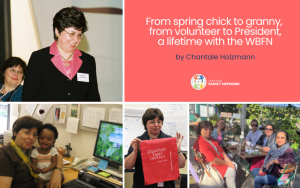
by Laurence Telson, DAPP Coordinator and Ashikur Rahman, Incoming WBGFN President Operations
Human lives are shaped by rules about how men and women are supposed to be: our ideas, choices, preferences, and behaviors. Patriarchal cultures impose rigid norms, such as men should be the ones to work and bring money home to provide for their families and that household chores and taking care of young children are women’s work.
Today, many men are navigating reversed roles unlike those they have been taught since birth, with little best practices and are learning by doing. Ashikur Rahman’s blog draws on his experience as dad to his children and spouse to a WBG staff.
Choosing to follow your spouse away from your home country comes with many downsides; Loss of extended family and their support, disruption of career progression and professional status, frequent bouts of self-doubt and recurring thoughts that involve “what was I thinking?”
However, if you happen to be a father, one benefit that comes with it is, more time spent with your child. This is particularly true if you are moving from a more traditional culture/society.
It takes a village to raise a child, the adage goes. This is truer perhaps in more traditional cultures, where small children are often looked after or given a lot of time by grandparents (maternal and paternal). They are also doted upon by many uncles and aunts (from both sides, again), and a set of relatives. Of course, the primary parent is the mother, but fathers often can afford to take a back seat as there is already a group eager to take care of the child. Indeed, they are often encouraged by peers and society as well. Traditionally, there isn’t much of an expectation on the father to spend as much time (as the mother does) with the child, except when it comes to ‘report card review’ or maybe some disciplining. Ultimately, what it entails is a reduced proportion of time a dad spends with the kid.
So of course, a distance develops – which both the child and the father find challenging to bridge in the later years. A daughter finds it difficult to have a conversation with her Baba, and a son views Papa as a one-dimensional figure whose expectations he struggles to understand. Traditional views of masculinity and fatherhood also do not help – enforcing a stereotypical concept of fatherhood that men are supposed to emulate.
Moving away from home, as hard as it was, enabled me to reboot my relationship as a father with my child. I had to take up responsibilities that earlier were taken on by a grandparent, nanny, or solely by my wife. I had to learn which activities she loved, what games she enjoyed playing, which quick fix foods I could make for her in a pinch.
It was not easy. In fact, it was very frustrating. Given what I already mentioned about an extended family taking care of kids, I didn’t foresee that I would be taking on hands-on parenting for a small child to this extent.
At the same time, I did not know that it would be fun, and it would be rewarding. Only after I engaged so much with my child, and only after she became such a big part of my daily life, did I realize what I had been missing before. I am glad that I got the opportunity, however serendipitously, to bond with my child when she was young.
I also gained a renewed respect for my wife. I never got to really understand and appreciate, the extent of what she did for our daughter daily (along with a busy work life) before I engaged in this level of parenting. Nothing like running a marathon in the other person’s shoes!
Lastly, my realization has been that the number of parental tasks that can ONLY be done by mothers is probably much, much smaller than I’d thought (certainly smaller than what a lot of societies and cultures think!). Setting up divisions of labor in parenting work (“I always help with the kids’ studies, and she helps them get ready for school – that's not my area”) hinders flexibility in a couple. If both parents engage in each other’s area of parenting work, it will make your family more flexible and better positioned to deal with changes in schedules and routines.
Ashikur Rahman
Dad Bio
Ashik is the proud father to Liyaana and Ansharah, rising sixth and first graders, respectively. When he is not playing Lego or Animal Crossing with the kids or doing their school pick up and drop offs, Ashik works as a marketing & communications consultant.
Regular Bio
Ashik is an experienced marketing and communications professional, working in communications and brand management for most of his professional career. He has worked in senior management positions in multinationals such as Unilever, Telenor/Grameenphone and Marico – with top and bottom-line responsibility for businesses, brands and projects and as a consultant to businesses and organizations in the DC area.
He has an MBA from the George Washington University School of Business and is a Beta Gamma Sigma honor society member.






